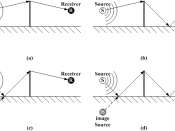University of PhoenixQuality Management and ProductivityIn today's corporate world the need for total quality management (TQM) is a vital aspect of any organization when remaining competitive. This paper will define total quality management (TQM) as well as include a description of the impact of globalization on quality. This paper will also compare and contrast traditional management styles with quality focused management styles, and explain how total quality management (TQM) applies to ABC Bank.
In today's business world, organizations must focus on quality. Competitors are exceeding the organizations that fail to provide quality services and products at a reasonable cost. In the early 1950s, Dr. W. Edwards Deming introduced the concept of Total Quality Management (TQM) in the United States. This concept was not supported in the US so Dr. Edwards took the theory over to Japan where Japanese industrialists welcomed the concept (Hanks, 1996, p.7). In Japanese industries production increased due to TQM.
In today's society Japan is a leader in producing quality products which are distributed worldwide. Today's organizations realize the need to focus on the quality of services and goods in order to maintain competitiveness. Organizations are implementing Dr. Edwards's principles across the field of services and production industries throughout the United States (Hanks, 1996, p.7). TQM is defined as organizational improvement or better stated in SEMETECH's definition of TQM (as cited in Burrill & Ledolter, 1999, p. 34):Total Quality Management is a [holistic] business management methodology that aligns the activities of all employees in an organization with the common focus of customer satisfaction [to be achieved] through continuous improvement in the quality of all activities [processes], goods and services. (p. 34)TQM transforms the organizational culture through changes in all areas of the organization such as principles and practices, attitudes, systems, and structure (Burrill & Ledolter, 1999).
Impact of Globalization on Quality"Globalization refers to the shift toward a more integrated and interdependent world economy" (Hill, 2009, p.6). Globalization is the process in which economies of countries all around the world become integrated over a period of time leading to organizations having access to a wider market base and consumers having access to a larger variety of goods and services (Hill, 2009). Increased global competition, reduced trade and distribution barriers, increased technology and information have broadened customer choices increasing the need for organizations to produce quality products to compete in the marketplace. As a result of the increased global competition, organizations have transformed their organizational performance through methods that are referred to as TQM, Six Sigma, and ISO 9000 (Burrill & Ledolter, 1999).
Traditional Management Styles and Quality Focused Management StylesManagement styles have changed over the years as TQM has changed the way organizations view the managers' role. TQM is a management philosophy that focuses on meeting the customers' needs and meeting the organizational objectives (Hashmi, 2000-2009). Traditional management styles differ from quality focused management styles in many ways. A traditional manager is cost conscious, drives out complexity, and has a deep understanding of the business, whereas a quality focused manager are creative and innovative, tailor to customers, and retain a broad business perspective (Crom, 2000-2009). In whole, traditional management styles are on a micro scale whereas quality focused management styles are on the macro scale. One is looking at profit in the short term and the other is investing for the middle and longterm (Crom, 2000-2009).
TQM and ABC BankThe need for TQM is essential to ABC Bank. Hashmi (2000-2009), "The simple objective of TQM is 'Do the right things, right the first time, every time.'" (para.5). At ABC Bank employees must do what is right financially for the customer or the customer will bank at another financial institution. ABC Bank is constantly improving processes by incorporating the knowledge and experience of the employees. When customers have complaints, issues or concerns the employees have a special link on the intranet to communicate to upper management the customer's thoughts. When an employee sends a complaint or concern through this process someone in the department contacts the customer within 24 hours to resolve the issue. ABC Bank focuses on quality customer service.
The main objective of TQM is to achieve quality in all areas of the organization. This requires an organization to involve all employees in strategic planning and the decision-making process. The organizational culture must match with TQM and all employees must be clear about the process. The need for TQM practices is vital and important part of creating a quality product or service that will help the organization remain competitive in today's global environment. All employees and all management must participate in TQM to ensure success in any organization.
ReferencesBurrill, C.W. & Ledolter, J. (1999). Achieving Quality Through Continual Improvement. New York: John Wiley & Sons, Inc.
Crom, S. (2000-2009). Dispelling Several Myths About Leadership for Change. iSixSigma. Retrieved April 10, 2009, from http://www.isixsigma.com/library/content/c060222b.asp?action=printHanks, F. (1996). Procedures for the Office Professional (3rd ed.). Cincinnati, OH: South Western Educational Publishing.
Hashmi, K. (2000-2009). Introduction and Implementation of Total Quality Management (TQM). iSixSigma. Retrieved April 10, 2009, from http://www.isixsigma.com/library/content/c060222b.asp?action=printHill, C.W.L. (2009). International Business (7th ed.). New York: McGraw-Hill Irwin.
Padhi, N. (2000-2009). The Eight Elements Of TQM . iSixSigma. Retrieved April 10, 2009, from http://europe.isixsigma.com/library/content/c021230a.asp?action=print


